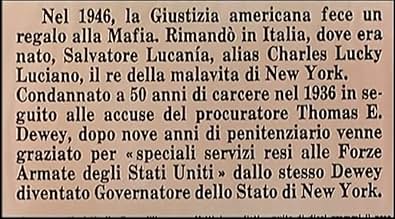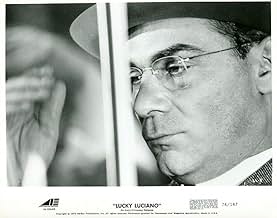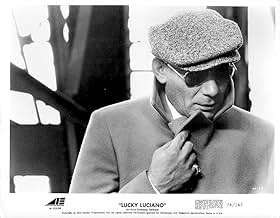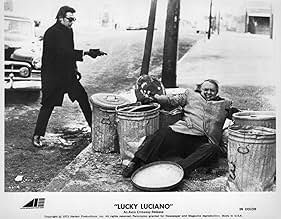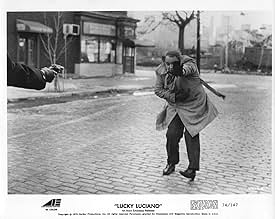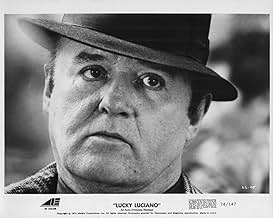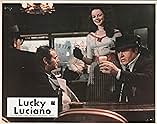VALUTAZIONE IMDb
6,4/10
1685
LA TUA VALUTAZIONE
Un film biografico del boss della mafia Lucky Luciano, che copre la sua vita dal 1946 al 1962 con flashback occasionali.Un film biografico del boss della mafia Lucky Luciano, che copre la sua vita dal 1946 al 1962 con flashback occasionali.Un film biografico del boss della mafia Lucky Luciano, che copre la sua vita dal 1946 al 1962 con flashback occasionali.
- Regia
- Sceneggiatura
- Star
- Premi
- 2 vittorie e 2 candidature totali
Edmond O'Brien
- Commissioner Harry J. Anslinger
- (as Edmund O'Brien)
Recensioni in evidenza
This is the real story behind Lucky Luciano , born Salvatore Lucania November 24, 1897 – January 26, 1962, the high priest of crime , the detailed account the world's most powerful mobster who built an empire on a sea of blood . This international co-production by Italy/US/France deals with the deported crime boss who is sent back to Italy . This picture is plenty of mayhem , strong stuff , drama and amount of gangland violence . Biographic movie about the notorious kingpin Lucky Luciano , though depiction is about the final years , including various flashbacks . Lucky is one of the bosses of the Mafia and leader of Cosa Nostra or Mafia, and soon became a chief in the Reina Family during the height of the Castellammarese War. Then takes place a Mafian War between Salvatore Maranzano, who eventually defeated the faction headed by rival Joseph Masseria . After Masseria's murder , this position was short-lived, as Maranzano himself was murdered in 1931 . Then , the family is headed by Charles "Lucky" Luciano , eventually known as the Genovese Family. He orders the slaughter of 40 other responsible , a famous massacre nicknamed Sicilian Vespers , therefore becoming the only boss. But a few years later he is put into jail.
This landmark mobster movie is strong stuff , being dominated by the tenacious acting of Gian Maria Volonte as the gangster of the title who follows his way venomously since his US expulsion through criminal career in Naples and Sicily . As trivia , previous Federal Narcotics Agent Charles Siragusa , Lucky's real-life nemesis , plays himself . There appears several known gangsters as Vito Genovese well played by Charles Cioffi and the informer named Giannini rightly performed by Rod Steiger . Director Francesco Rosi's body-strewn look at the feud between gangsters , Commissioners and Judges, , but especially concerns about Lucky Luciano given a good interpretation by Volonte . This is a violence-ridden story full of action, drama, thriller , suspense but being overlong . The notorious gangster Lucky Luciano is splendidly played by Gian Maria Volonte who makes a good character study of one of the most colorful mobsters of the history . Glimmer and evocative cinematography by Pasqualino De Santis , though being necessary a correct remastering . Adequate and atmospheric musical score by Piro Piccioni .
The motion picture is well based on true events : Lucky Luciano was an Italian-born, naturalized American mobster born in Sicily. Luciano is considered the father of modern organized crime in the United States for splitting New York City into five different Mafia crime families and the establishment of the first Commission. He was the first official boss of the modern Genovese crime family. He was, along with his associate Meyer Lansky, instrumental in the development of the National Crime Syndicate in the United States. On January 3, 1946, as a presumed reward for his alleged wartime cooperation, now Governor Thomas E. Dewey reluctantly commuted Luciano's pandering sentence on condition that he does not resist deportation to Italy. As two federal immigration agents transported Luciano from Sing Sing prison to Ellis Island in New York Harbor for deportation proceedings . In Italy and Sicily begins becoming one of the chief of the Mafia. The US Army seems to refrain from interfering his business . But in 1946, Luciano secretly moved to Havana, Luciano's objective in going to Cuba was to be closer to the United States so that he could resume control over American Cosa Nostra operations and eventually return to the United States. Meyer Lansky was already established as a major investor in Cuban gambling and hotel projects . In October 1963, Valachi had testified before Subcommittee on Investigations of the U.S. Senate Committee on Government Operations that the Mafia did exist . Although Valachi's disclosures never led directly to the prosecution of many Mafia leaders, he was able to provide many details of its history, operations and rituals, as well as naming many members and the major crime families , Luciano among them . With the death of Maranzano, Luciano became the dominant organized crime boss in the United States. He had reached the pinnacle of America's underworld, directing criminal rules, policies and activities along with the other family bosses. Luciano also had his own crime family, which controlled lucrative criminal rackets in New York City such as illegal gambling, bookmaking, loan-sharking, drug trafficking and extortion. Luciano became very influential in labor and union activities and controlled the Manhattan Waterfront, garbage hauling, construction, Garment Center businesses and trucking.
This landmark mobster movie is strong stuff , being dominated by the tenacious acting of Gian Maria Volonte as the gangster of the title who follows his way venomously since his US expulsion through criminal career in Naples and Sicily . As trivia , previous Federal Narcotics Agent Charles Siragusa , Lucky's real-life nemesis , plays himself . There appears several known gangsters as Vito Genovese well played by Charles Cioffi and the informer named Giannini rightly performed by Rod Steiger . Director Francesco Rosi's body-strewn look at the feud between gangsters , Commissioners and Judges, , but especially concerns about Lucky Luciano given a good interpretation by Volonte . This is a violence-ridden story full of action, drama, thriller , suspense but being overlong . The notorious gangster Lucky Luciano is splendidly played by Gian Maria Volonte who makes a good character study of one of the most colorful mobsters of the history . Glimmer and evocative cinematography by Pasqualino De Santis , though being necessary a correct remastering . Adequate and atmospheric musical score by Piro Piccioni .
The motion picture is well based on true events : Lucky Luciano was an Italian-born, naturalized American mobster born in Sicily. Luciano is considered the father of modern organized crime in the United States for splitting New York City into five different Mafia crime families and the establishment of the first Commission. He was the first official boss of the modern Genovese crime family. He was, along with his associate Meyer Lansky, instrumental in the development of the National Crime Syndicate in the United States. On January 3, 1946, as a presumed reward for his alleged wartime cooperation, now Governor Thomas E. Dewey reluctantly commuted Luciano's pandering sentence on condition that he does not resist deportation to Italy. As two federal immigration agents transported Luciano from Sing Sing prison to Ellis Island in New York Harbor for deportation proceedings . In Italy and Sicily begins becoming one of the chief of the Mafia. The US Army seems to refrain from interfering his business . But in 1946, Luciano secretly moved to Havana, Luciano's objective in going to Cuba was to be closer to the United States so that he could resume control over American Cosa Nostra operations and eventually return to the United States. Meyer Lansky was already established as a major investor in Cuban gambling and hotel projects . In October 1963, Valachi had testified before Subcommittee on Investigations of the U.S. Senate Committee on Government Operations that the Mafia did exist . Although Valachi's disclosures never led directly to the prosecution of many Mafia leaders, he was able to provide many details of its history, operations and rituals, as well as naming many members and the major crime families , Luciano among them . With the death of Maranzano, Luciano became the dominant organized crime boss in the United States. He had reached the pinnacle of America's underworld, directing criminal rules, policies and activities along with the other family bosses. Luciano also had his own crime family, which controlled lucrative criminal rackets in New York City such as illegal gambling, bookmaking, loan-sharking, drug trafficking and extortion. Luciano became very influential in labor and union activities and controlled the Manhattan Waterfront, garbage hauling, construction, Garment Center businesses and trucking.
Francesco Rosi's film is a very fine and unglamorous treatment of the most famous mafioso of the 20th Century. Filmed in a quasi-documentary style, with un-enhanced sound recorded directly in real-life settings, we constantly have the feeling that we are watching real characters and not actors, even if one of the greats, Gian Maria Volontè, plays Luciano. And apparently many of the cast are indeed non-actors, and a few are even playing themselves. The movie is genuinely refreshing in that it does not romanticize or glorify or gloss over Luciano or the gangster's life. Early on it shows extremely violent scenes that condense a tremendous amount of background story into just what we need to know about Luciano's rise to preeminence in the underworld. And it's a great hook to start the film when the gangster's famous American life is ending. It's definitely a film for thoughtful adults, no cartoonish tidbits that would appeal to adolescents.
If you look at the history of Italian mobster Lucky Luciano, you'll find that most of the interesting stuff that happened in his life was when he was young. Forming a street gang as a kid, being arrested numerous times, surviving being stabbed and beaten over and over again. Working for the old school, 'Moustache Pete'-type mafioso, Luciano sought to get rid of the old guard and get rid of the 'boss of all bosses' title that encouraged rivalry and instead put in place a commision of mob families that could be mediated and would avoid gang wars. It's a bit of mystery why this film starts at this point, skips his trial for pandering in the US, and goes almost straight away to his deportation to Italy.
We do get a bit about Luciano's involvement in the preparations of the invasion of Sicily and the immediate events following this (the mob basically controlling the black market while pretending they are doing the opposite, and also assisting the US army in sending intelligence back from Sicily), but a lot of this doesn't acutally involved Luciano at all! This, plus a sub plot involving Rod Steiger as a treacherous drug smuggler, mean that for about three quarters of the film, actor Gian Marie Volonte doesn't have much to do with the Luciano character.
The film jumps between various events which also fractures the narrative a bit more, but the film isn't a disaster, just a bit unengaging. Volonte, when he does have something to play about with, conveys Luciano as a charismatic, confident man, presenting himself as a charmer to the various journalists who follow him about and as an innocent deportee to the police who are trying to hang a drug smuggling charge on him.
Violence and action wise there's not much going for it, save for the murder of the old mafiosi at the start of the film. If you've read any history on Luciano, you'll know what happened to him in the end. It's interesting, but not the best way to end of film!
We do get a bit about Luciano's involvement in the preparations of the invasion of Sicily and the immediate events following this (the mob basically controlling the black market while pretending they are doing the opposite, and also assisting the US army in sending intelligence back from Sicily), but a lot of this doesn't acutally involved Luciano at all! This, plus a sub plot involving Rod Steiger as a treacherous drug smuggler, mean that for about three quarters of the film, actor Gian Marie Volonte doesn't have much to do with the Luciano character.
The film jumps between various events which also fractures the narrative a bit more, but the film isn't a disaster, just a bit unengaging. Volonte, when he does have something to play about with, conveys Luciano as a charismatic, confident man, presenting himself as a charmer to the various journalists who follow him about and as an innocent deportee to the police who are trying to hang a drug smuggling charge on him.
Violence and action wise there's not much going for it, save for the murder of the old mafiosi at the start of the film. If you've read any history on Luciano, you'll know what happened to him in the end. It's interesting, but not the best way to end of film!
Reading some of the other reviews of Rossi's Lucky Luciano it is worth remembering that before it's release in 1974 the Italian film censors got their hands on Rossi's final cut and butchered it against his wishes, his protestations falling on deaf ears. It would appear this is the only cut that has survived official interference and, why I suspect it is so disjointed in its chronology. It is with this unwarranted and suspicious interference from the Italian censor that we should view this movie and which makes the content so much more revealing about the Italian state and how it's hidden hand works on different levels.
This is a very powerful and sophisticated film so both character and historical background knowledge is essential before viewing to make this a much more rewarding experience. Rossi is a master of political expose in cinema and deserves credit to agree releasing it in this pared down version - which must have stuck in his throat to do so at 100/110 minutes according to which distributors copy you buy -
This is a very powerful and sophisticated film so both character and historical background knowledge is essential before viewing to make this a much more rewarding experience. Rossi is a master of political expose in cinema and deserves credit to agree releasing it in this pared down version - which must have stuck in his throat to do so at 100/110 minutes according to which distributors copy you buy -
I would say that i find crime films to be something of a guilty pleasure, from Paul Muni in Scareface (1932) to Marlon Brando in The Godfather (1972) and all the sub genders in between i am normally a fan and gangster films have held audiences interest for as long as the movies have talked. So it was a surprise to me that i found this film such a ordeal to get through, on my viewing copy the language used is Italian and English in equal measure where appropriate, this adds authenticity but since i do not understand Italian, much of this speech dominated film simply passed me bye and there were no sub titles to help out.I also found it's time shifting narrative very confusing as the film did not give us many dates to hang on to. This is i suppose a thinking man's gangster film, i wish i had enjoyed it more for the acting from a unknown cast seemed first rate.A pity but just 5 from 10 from me.
Lo sapevi?
- QuizIn Senses of Cinema's translation of an interview with film critic Michel Ciment for 'Le Dossier Rosi' (1976), director Francesco Rosi said of Charles Siragusa's war against Lucky Luciano: "He feels like the victim of a conspiracy he can't quite comprehend . . . that someone or something is stopping him from carrying out his work the way he wants to".
- BlooperWhen Lucky Luciano is deported in the mid-Forties, far more modern buildings can be seen on the New York skyline.
- ConnessioniFeatured in Diario napoletano (1992)
I più visti
Accedi per valutare e creare un elenco di titoli salvati per ottenere consigli personalizzati
- How long is Lucky Luciano?Powered by Alexa
Dettagli
- Data di uscita
- Paesi di origine
- Lingue
- Celebre anche come
- Re: Lucky Luciano
- Luoghi delle riprese
- Genova, Liguria, Italia(Docks)
- Aziende produttrici
- Vedi altri crediti dell’azienda su IMDbPro
Contribuisci a questa pagina
Suggerisci una modifica o aggiungi i contenuti mancanti

Divario superiore
By what name was Lucky Luciano (1973) officially released in India in English?
Rispondi
